Barry Hollander remembered
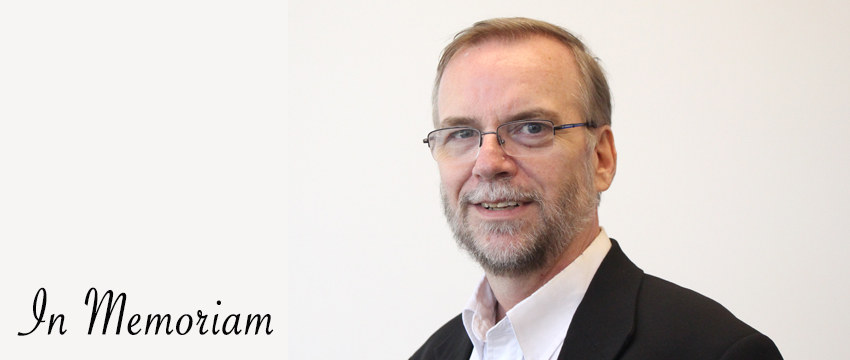
Barry Hollander remembered
Many students, alumni, faculty, staff and friends sent memories and messages of condolence via social media and other platforms. A representative collection of these thoughts can be found here. The preferred viewing browser is Chrome.
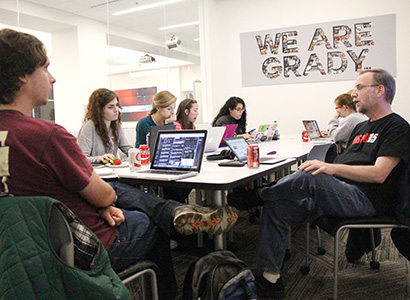
Students remember his wit and his gruff sense of humor. Alumni remember his relentless pursuit of accuracy and the verification of facts in journalism. Others remember his regular classroom challenge: “If your mother says she loves you, check it out.” Everyone remembers his passion for journalism and educating the next generation.
Barry Hollander, professor of journalism at Grady College for 26 years, died on Jan. 30, 2018.
“Barry was a great journalist and journalism professor,” Charles Davis, dean of Grady College said. “He taught the fundamentals of reporting to nearly every journalism and public relations student in Grady for more than 20 years, and he delighted in following their work in The Red & Black and Newsource.”
Hollander joined Grady College as an assistant professor in 1991, and taught hundreds of students how to report sound, fact-based journalism. He was the first professor many Grady students had for basic reporting and information gathering, and he taught graduate students public opinion and special topics classes.
Greg Bluestein (ABJ ’04), political reporter for The Atlanta Journal-Constitution, said Hollander always encouraged his students to learn what they could in the classroom, then take that knowledge and apply it elsewhere through writing for local newspapers or working at internships.
“It was pushing us to be bold and confident about what he taught us, and what Grady taught us,” Bluestein said.
Hollander was influential in Bluestein’s life after college, as well, frequently providing feedback.
“He was kind of a constant sort of presence in the back of our minds as journalists out there saying ‘you know, maybe we should have pushed harder on this,’” Bluestein continued. “He was never doing it in a negative or critical way, but more of a life-long educator way. Even after we were out of UGA, he was pushing us to think about how we reported things.”
Pulitzer Prize-winning author Dan Fagin worked with Hollander when they were both working at the Punta Gorda bureau of the Sarasota Herald-Tribune in the mid-1980s.
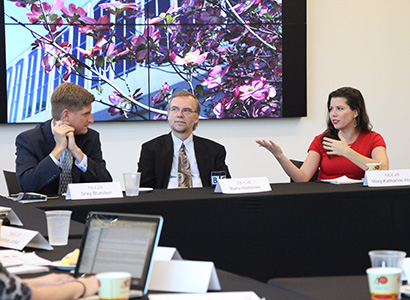
“It was my first job out of school,” Fagin said, “and Barry would mock me mercilessly about being an Ivy League boy. Like most people who truly love our profession, his hard shell of hilarious cynicism, (saying things like) ‘that paper’s not fit to wrap fish,’ couldn’t quite conceal his fondness for the job.”
“The only people who escaped his rapier wit,” Fagin continued in a message on Twitter, “were Edith and his two kids, Jacob and Erin. He unashamedly reveled in their love, and in their remarkable accomplishments, too.”
Samira Jafari (ABJ ’02), an executive producer at CNN, said that news was in his DNA and that she felt like she was working with a real newsman while in his class.
“He pushed us to get the tough stories and ask the tough questions,” Jafari said. “He had such faith in the students to be able to do that. He injected this gumption and this courage to go and get the tough stories.”
Jafari recalled that Hollander had encouraged her to pursue an unsolved crime story when she was a student. It was a difficult and emotional story, but he helped her build the characters and navigate the difficult interviews.
“It never would have occurred to me that I would have been capable of doing that if someone didn’t take time out of class to say ‘hey, I think you can do this and I think you would really grow from it,’” Jafari said.
Lindsey Cook (ABJ ’14), a digital skills editor for the New York Times, was another student who Hollander encouraged.
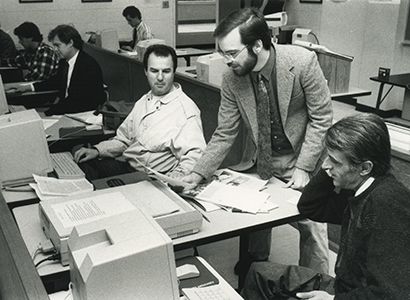
“I can’t overstate Hollander’s impact on my life and career,” Cook said. “He was a committed mentor for all the self-described nerds at Grady, including myself, and always met his students with a smile, cup of coffee and his signature wit.”
Like others, Cook remembers his passion for news, and especially for supporting The Red & Black.
“He read the Red & Black religiously,” Cook recalled. “Many Red & Black editors and reporters know the feeling of an email from Hollander in your inbox with praise, a story suggestion or sass-layered criticism.”
Hollander’s classes were the first many took at Grady College, and although he sprinkled anecdotes throughout his lectures, he taught that it was not anecdotes, but facts, that made the story. His red pen was well known in the halls of Grady, but his lessons encouraged countless students to appreciate the hallmarks of journalism as much as he did.
“Hollander valued facts and accountability more than most people I’ve met,” said Daniel Funke (ABJ ’17), a reporter at The Poynter Institute.
Scott Trubey (ABJ ’05), a business reporter for The Atlanta Journal-Constitution, said it was Hollander’s class that convinced him that journalism is what he wanted to do for a living.
“He kept you on your toes, and the thing that I think about the most about him is how much he cared for the craft and how much he instilled the need to care for the craft from the very early stages,” Trubey said.
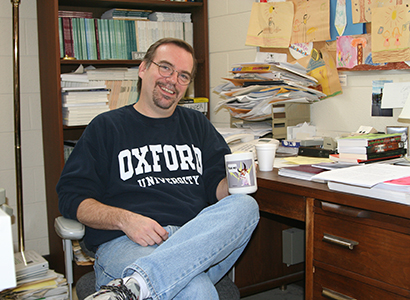
He continued: “Hollander was also great about data and how important it was. He showed how to craft narrative around data. He had a way of taking numbers and painting a picture that I think left a mark on me and so many of my other classmates who went on to be reporters.”
Hollander was awarded not only praise from students, but also several awards through the years including the Department of Journalism’s teacher the year, Student Government teacher of the year, and the UGA Honors Program’s top teaching award.
Outside of the classroom, Hollander was an avid poster on Twitter, his blog, What People Know, and on the platform, Medium, citing transparent observations about politics, data, the University of Georgia and his illness.
“What he wrote on Medium and also what he wrote on Twitter and social media… his personality showed through all of this horrible scourge of cancer,” Bluestein said. “But, some of his Tweets are hilarious. It was a real example to us all. He is sort of poking fun of it all.”
Jafari cited his candor, honest and no-nonsense tone as favorite attributes, as well as his looking out for his students, many times as a parent would.
“I loved that he had our backs without coddling us,” Jafari said. “When you care about people, you don’t want to be so protective that they don’t learn. You also look out for them so they succeed and he was good like that.”
“He is not forgettable,” Jafari concluded. “He is someone who made an impact on a lot of us. He should very much be credited for shaping our lives after college. We wouldn’t be where we are without people like him, and that’s his legacy—to help other people have one, too.”
Hollander’s words can best be summed up by reading his obituary, which he wrote.
Other remembrances can be viewed here: